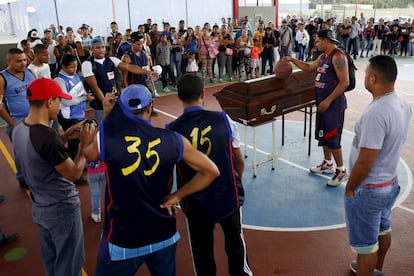Venezuelan capital takes top ranking as most violent city in the world
Murder rate now stands at 119 victims per 100,000 residents, says Mexican NGO
A new report by a Mexico City-based NGO has ranked Caracas, the capital of Venezuela, as the world’s most dangerous city. Caracas’s homicide rate has soared to as many as 119 murders per 100,000 residents, according to the Citizen Council for Public Safety and Criminal Justice, which examines the crime rates in major cities and publishes its findings in a survey. Besides Caracas, other Venezuelan cities that ranked in the top seven as being the most dangerous are Maturín and Valencia. Last week, the International Monetary Fund (IMF) also placed Venezuela in the dubious position of having the highest inflation rate in the world. The IMF predicts inflation will reach 720% this year from 141.5% for the year to the end of September 2015.

Caracas has knocked off San Pedro Sula (Honduras) from the top ranking as being the most violent city in the world. San Salvador (El Salvador) placed third while the Pacific resort of Acapulco, in Mexico’s Guerrero state, came in fourth in the list.
But there are more troubled cities in Venezuela, according to the Mexican NGO. Acapulco is followed by Maturín, Monagas state, and Valencia, Carabobo state.
Venezuelan President Nicolás Maduro and his supporters believe that the recent negative figures and rankings coming from international organizations are part of campaign launched by “imperialist forces” to destroy his government. He made this clear during his recent State of the Nation address.
But despite the president’s charges, the wave of violence that occurs each day in Venezuela cannot be ignored.
El Conejo’s reported dealings and transactions in the island of Margarita are legendary
One of the most recent high-profile killings was the murder of drug capo Teófilo Cazorla Rodríguez, who was also known as El Conejo (The Rabbit).
Cazorla, who was gunned down on Monday, ran the drug trafficking trade inside the San Antonio penitentiary located in Venezuela’s resort island Margarita. He had been sentenced in 2003 but last year El Conejo was allowed to complete his term outside the prison, reporting to court on a regular basis.
Early Monday, Cazorla and several others, who were identified as his bodyguards, went to a disco and later left the establishment. They were ambushed by unknown gunmen.
Police believe that rival drug gangs ordered the hit in a dispute for control of drug trafficking trade.
El Conejo’s death is likely to see his legendary status grow yet further. He was one of the best-known criminals on the island, and stories about his reported dealings and transactions – which cannot be confirmed – are often told and retold.
Most inmates in the San Antonio prison are serving time for drug trafficking, but are subject to lax rules
In 2011, reporters from The New York Times were given access to the San Antonio prison, where the majority of inmates are serving time for drug trafficking. The reporters found how prisoners were not subject to strict rules. Images taken by the daily showed some of them dancing to Caribbean-style music played by a DJ, while their children were seen in a swimming pool set up inside the penitentiary.
It was believed that El Conejo was responsible for these lax rules.
On Monday, a group of inmates climbed the roof of the San Antonio penitentiary and fired their weapons in the air in honor of El Conejo.
Videos of the event, which were circulated on social media, drew outrage from many, including former opposition presidential candidate Henrique Capriles.
“Does this look right to you?” Capriles asked Defense Minister Vladimir Padrino López on Twitter. “These weapons belong to the armed forces.”
English versión by Martin Delfín.
Tu suscripción se está usando en otro dispositivo
¿Quieres añadir otro usuario a tu suscripción?
Si continúas leyendo en este dispositivo, no se podrá leer en el otro.
FlechaTu suscripción se está usando en otro dispositivo y solo puedes acceder a EL PAÍS desde un dispositivo a la vez.
Si quieres compartir tu cuenta, cambia tu suscripción a la modalidad Premium, así podrás añadir otro usuario. Cada uno accederá con su propia cuenta de email, lo que os permitirá personalizar vuestra experiencia en EL PAÍS.
¿Tienes una suscripción de empresa? Accede aquí para contratar más cuentas.
En el caso de no saber quién está usando tu cuenta, te recomendamos cambiar tu contraseña aquí.
Si decides continuar compartiendo tu cuenta, este mensaje se mostrará en tu dispositivo y en el de la otra persona que está usando tu cuenta de forma indefinida, afectando a tu experiencia de lectura. Puedes consultar aquí los términos y condiciones de la suscripción digital.








































